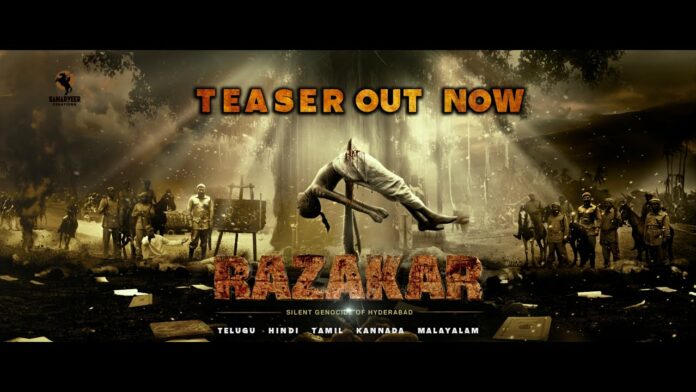
In recent times, Indian cinema has become a platform for films that delve deep into historical events, sparking emotions, discussions, and sometimes even heated debates. Movies like “Kashmir Files” and “Kerala Story” have not only captivated audiences but also ignited strong reactions across the nation. While some perceive these films as propaganda or pro-BJP narratives, others commend them for their storytelling prowess.
“Razakar”: The Teaser That Set the Stage
Adding to this cinematic wave is the upcoming film, “Razakar,” produced by BJP leader Gudur Narayana Reddy. The mere release of its teaser has sent shockwaves throughout the country. The teaser launch event was graced by the presence of suspended BJP leader and Goshamahal MLA T Raja Singh, who, along with other speakers, hailed the film as an exceptional endeavor that aims to raise awareness. Interestingly, comparisons were drawn between “Razakar” and earlier films like “The Kashmir Files” and “The Kerala Story.”
Controversy Brews: Political Reactions
However, the release of “Razakar” has not been without its fair share of controversies. Telangana Minister K T Rama Rao (KTR) expressed his concerns on Twitter, suggesting that certain factions within the BJP were attempting to exploit communal sentiments for political propaganda. He firmly committed to taking the matter up with the censor board and Telangana police to ensure that the state’s law and order remains uncompromised.
Unearthing History: Who Were the Razakars?
“Razakar” delves into a significant chapter in Indian history by examining the controversial paramilitary organization led by Qasim Razvi during the pre-independence era. Primarily active in the princely state of Hyderabad, the Razakars staunchly supported the Nizam’s rule. However, their methods often included violence, intimidation, and even atrocities against those advocating integration with India. This turbulent period ultimately led to the Indian government’s intervention in Operation Polo, resulting in the annexation of Hyderabad into independent India in 1948.
The Divisive Impact of Historical Films
The release of such historical films tends to polarize opinions. On one hand, some argue that these films threaten secularism and stoke communal tensions. On the other hand, there are those who believe that they shed light on crucial historical events that deserve acknowledgment. The influence of “Razakar” on contemporary politics, particularly on parties like MIM and BRS, remains a topic of keen interest.
As the debate surrounding “Razakar” continues to unfold, one thing is evident: this film marks another chapter not only in India’s cinematic journey but also in the political landscape of India.







